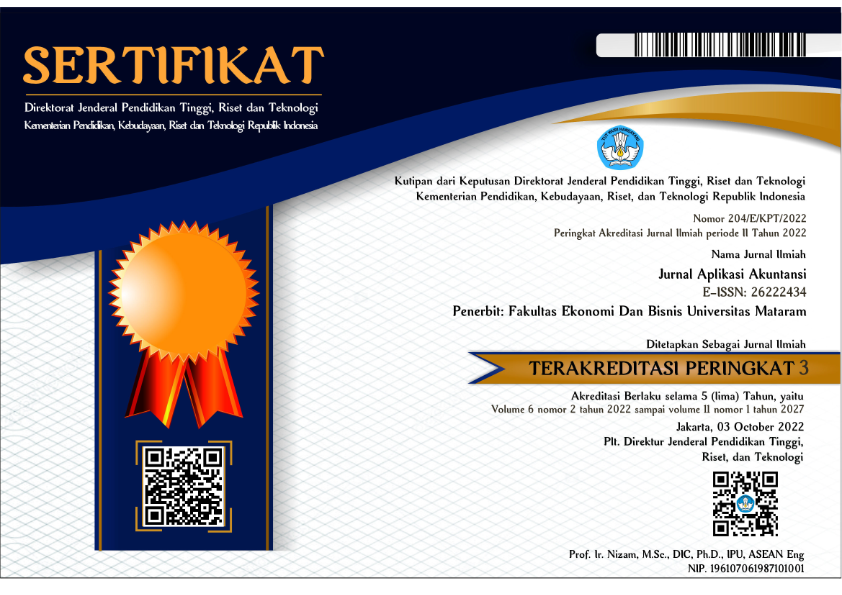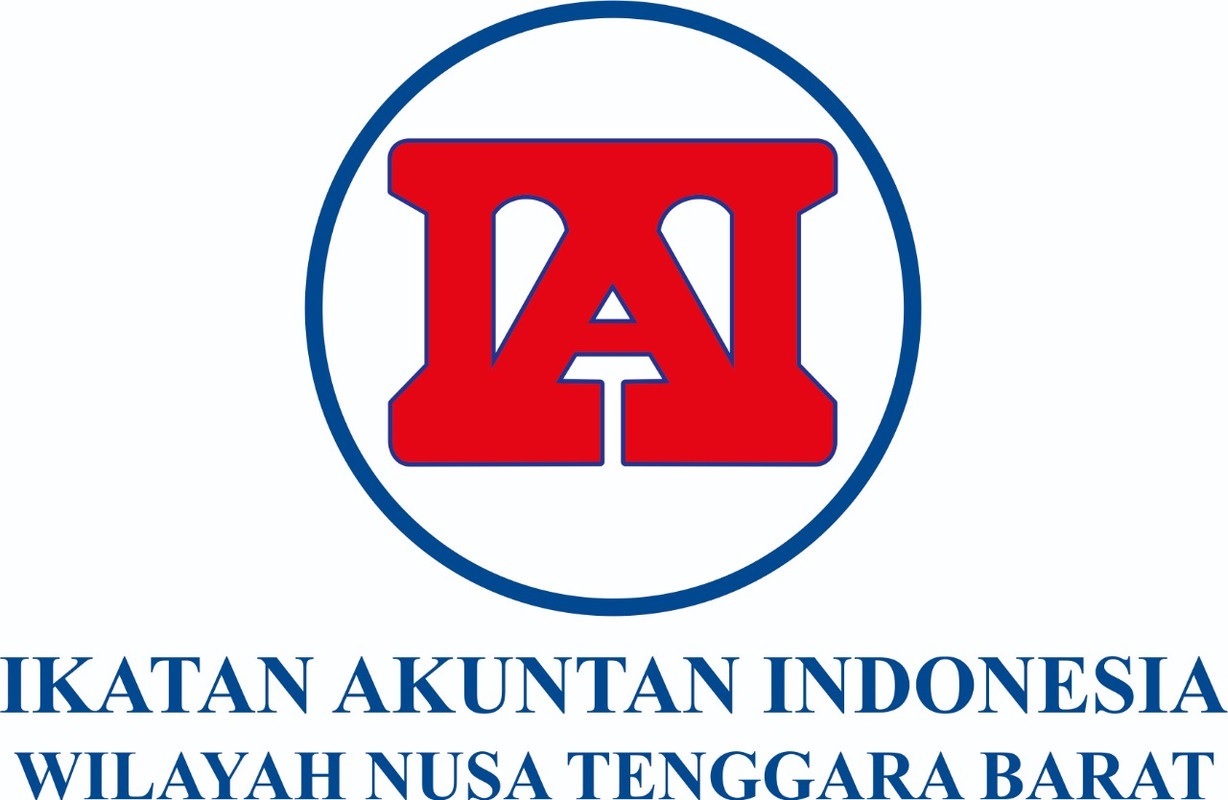ANALISIS PERINGKAT INDEKS LINGKUNGAN, SOSIAL, DAN TATA KELOLA MENGGUNAKAN CARBON DISCLOSURE PROJECT (CDP)
DOI:
https://doi.org/10.29303/jaa.v7i2.205Keywords:
Indeks Lingkungan, Sosial, dan Tata Kelola (LST), Perubahan IklimAbstract
Penelitian ini bertujuan untuk melakukan analisis peringkat indeks Lingkungan, Sosial, dan Tata Kelola (LST) bagian perubahan iklim, serta memberikan rekomendasi perbaikan atas inisiatif perubahan iklim untuk Perusahaan Z. Bertambahnya jumlah perusahaan yang memiliki inisiatif perubahan iklim, mengharuskan adanya lembaga yang melakukan penilaian akan pengungkapan inisiatif perubahan iklim perusahaan (Carbon Disclosure Project (CDP), Sustainalytics). Penilaian diperlukan untuk memberikan kepastian bahwa inisiatif yang diungkapkan sudah dilakukan perusahaan dan memiliki dampak bagi pengurangan perubahan iklim. Penelitian ini dilakukan melalui observasi dan desk study dengan menganalisis jawaban peringkat indeks LST Perusahaan Z. Indeks LST ditentukan dengan menilai indeks CDP, benchmark jawaban CDP Perusahaan Z dengan perusahaan di Industri yang memiliki produk serupa, analisis kekurangan pengungkapan indeks CDP Perusahaan Z tahun 2021, dan memberikan saran/rekomendasi perbaikan untuk Perusahaan Z terkait pengungkapan data pada peringkat CDP. Berdasarkan analisis, nilai peringkat CDP Perusahaan Z kurang maksimal disebabkan karena belum melakukan pengukuran emisi, belum melakukan verifikasi perhitungan emisi dengan pihak ketiga, tidak menjawab pertanyaan sesuai metodologi, belum memiliki target terkait Science Based Target (SBT), dan belum menghitung dampak finansial dari risiko dan peluang perubahan iklim. Rekomendasi yang diberikan adalah melakukan perhitungan emisi sesuai dengan metodologi (berdasarkan aktivitas bisnis, fasilitas bisnis, dan produk), verifikasi perhitungan emisi dengan pihak ketiga, menyesuaikan jawaban dengan standar metodologi, membuat target yang selaras dengan SBT, dan menghitung dampak finansial dari risiko, serta peluang perubahan iklim
References
Asadikia, A., Rajabifard, A., & Kalantari, M. (2021). Systematic prioritisation of SDGs: Machine learning approach. World Development, 140. https://doi.org/10.1016/j.worlddev.2020.105269
Grimstad, S. M. F., Glavee-Geo, R., & Fjørtoft, B. E. (2020). SMEs motivations for CSR: an exploratory study. European Business Review, 32(4). https://doi.org/10.1108/EBR-01-2019-0014
Gunawan, J., & Susilo, H. (2022). Corporate Social Responsibility, Corporate Reputation, and Share Price: A Study of Consumer Goods Industries using Sustainable Accounting Standard Board (SASB) Disclosures. Jurnal Magister Akuntansi Trisakti, 9(1), 37–54. https://doi.org/10.25105/jmat.v9i1.8841
Hallin, A., Karrbom-Gustavsson, T., & Dobers, P. (2021). Transition towards and of sustainability—Understanding sustainability as performative. Business Strategy and the Environment, 30(4). https://doi.org/10.1002/bse.2726
Holland, M., Stjepandic, J., & Nigischer, C. (2018). Intellectual Property Protection of 3D Print Supply Chain with Blockchain Technology. 2018 IEEE International Conference on Engineering, Technology and Innovation, ICE/ITMC 2018 - Proceedings. https://doi.org/10.1109/ICE.2018.8436315
Hsieh, H. F., & Shannon, S. E. (2005). Three approaches to qualitative content analysis. Qualitative Health Research, 15(9), 1277–1288. https://doi.org/10.1177/1049732305276687
Jackson, G., Bartosch, J., Avetisyan, E., Kinderman, D., & Knudsen, J. S. (2020). Mandatory Non-financial Disclosure and Its Influence on CSR: An International Comparison. Journal of Business Ethics, 162(2). https://doi.org/10.1007/s10551-019-04200-0
Juárez, L. E. V., Escobar, E. A. R., & Guzmán, G. M. (2017). The Effects of Absorptive Capacity, Intellectual Property and Innovation in SMEs. Journal of Management and Sustainability, 7(4). https://doi.org/10.5539/jms.v7n4p36
Kılıç, M., & Kuzey, C. (2019). The effect of corporate governance on carbon emission disclosures: Evidence from Turkey. International Journal of Climate Change Strategies and Management, 11(1). https://doi.org/10.1108/IJCCSM-07-2017-0144
Lestari, J., & Solikhah, B. (2019). The Effect of CSR, Tunneling Incentive, Fiscal Loss Compensation, Debt Policy, Profitability, Firm Size to Tax Avoidance. Accounting Analysis Journal, 8(1). https://doi.org/10.15294/aaj.v8i1.23103
Mihalic, T. (2016). Sustainable-responsible tourism discourse - Towards “responsustable” tourism. Journal of Cleaner Production, 111. https://doi.org/10.1016/j.jclepro.2014.12.062
Oware, K. M., & Mallikarjunappa, T. (2022). CSR expenditure, mandatory CSR reporting and financial performance of listed firms in India: an institutional theory perspective. Meditari Accountancy Research, 30(1). https://doi.org/10.1108/MEDAR-05-2020-0896
Papoutsi, A., & Sodhi, M. M. S. (2020). Does disclosure in sustainability reports indicate actual sustainability performance? Journal of Cleaner Production, 260. https://doi.org/10.1016/j.jclepro.2020.121049
Park, K. O. (2020). How CSV and CSR affect organizational performance: A productive behavior perspective. International Journal of Environmental Research and Public Health, 17(7). https://doi.org/10.3390/ijerph17072556
Yin, R.K. (2003). Qualitative Research Methods . SAGE Publication Ltd. https://books.google.co.id/books?hl=en&lr=&id=KdneDQAAQBAJ&oi=fnd&pg=PA359&dq=yin+2003+case+study&ots=gOMrExv99_&sig=N_u3j0-8cHDhYjeAG7m4bnBzAp0&redir_esc=y#v=onepage&q=yin%202003%20case%20study&f=false
Suriani, E. (2020). A Study of the Physical-Mechanical Properties of Bamboo in Indonesia. https://doi.org/10.5220/0008904601540162
Zhixia, C., Hossen, M. M., Muzafary, S. S., & Begum, M. (2018). Green banking for environmental sustainability-present status and future agenda: Experience from Bangladesh. Asian Economic and Financial Review, 8(5). https://doi.org/10.18488/journal.aefr.2018.85.571.585
Zumente, I., & Lāce, N. (2021). Esg rating—necessity for the investor or the company? Sustainability (Switzerland), 13(16). https://doi.org/10.3390/su13168940
Downloads
Published
How to Cite
Issue
Section
License
Copyright (c) 2023 Irene Gunawan, Juniati Gunawan

This work is licensed under a Creative Commons Attribution-NonCommercial-ShareAlike 4.0 International License.









